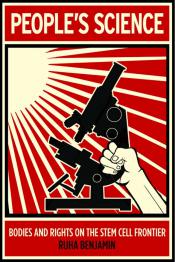Talking Biopolitics with Ruha Benjamin Interviewed by Marcy Darnovsky
June 25, 2013
[Video]
Please join Ruha Benjamin and the Center for Genetics and Society for Talking Biopolitics 2013. In this live web-based interview and conversation, Ruha will talk with CGS's Marcy Darnovsky – and with you – about her experiences in writing and promoting People’s Science: Bodies and Rights on the Stem Cell Frontier, and about her thoughts on the new biopolitics.
About the Book
|
What would a “people’s science” look like? Does the hotly contested area of stem cell research qualify? Dorothy Roberts describes Ruha Benjamin’s People’s Science as a book that “powerfully contests the autonomy of scientists and argues instead for a radically inclusive public engagement in science. Grounded in the heated battle over stem cell research, People's Science highlights the voices of people with disabilities, African Americans, and women to show why citizens should have the power to influence science as much as scientists influence society. A must read for students and scholars interested in science and society, as well as advocates for more democratic participation in cutting-edge biotechnologies." |
 |
About the Author
 |
Ruha Benjamin is assistant professor of Sociology and African American studies at Boston University and an American Council of Learned Societies fellow at the Harvard Kennedy School of Government Science, Technology, and Society Program. She is the author of People’s Science: Bodies and Rights on the Stem Cell Frontier (Stanford University Press 2013), has published articles in Ethnicity & Health, Policy & Society, and writes for the Huffington Post. Ruha also speaks widely and blogs about innovation and equity at facebook.com/peoples.science and on Twitter @Peoples_Science. |
Ruha received her BA in Sociology and Anthropology from Spelman College, and completed an MA and PhD at UC Berkeley in Sociology. Prior to joining the Boston University faculty, she was a postdoctoral fellow at UCLA’s Institute for Society and Genetics where she conducted research on genomic sovereignty policies in an international context. She currently teaches classes on the sociology of race and ethnicity; science and technology studies; and on biopolitics.
On a more personal note, Ruha was born in Wai, India and grew up equal parts in South Central Los Angeles and Conway, South Carolina. In addition to the United States, she has lived in Southern Africa and the South Pacific, and has visited over 20 countries in Africa, Asia, Europe, Central America, and the Caribbean. She lives with her husband and two sons in Brookline, Massachusetts.



